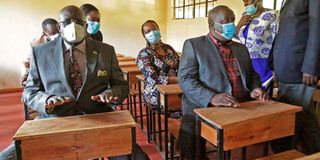Exams will have ‘human face’: CSs Matiang’i, Magoha say

Education Cabinet Secretary George Magoha (left) and his Interior counterpart Fred Matiang’i sit in one of the newly built classrooms at Egetonto Primary School in Kisii on December 6,2021. The two said the 2021 national examinations will take into consideration the effects of the Covid-19 pandemic on learning.
The 2021 national examinations slated for March and April next year will be tailor-made to factor in the challenges the candidates have faced due to the Covid-19 pandemic.
As a result, the Kenya Certificate of Primary Education (KCPE) and Kenya Certificate of Secondary Education (KCSE) examinations will be administered with what Education cabinet secretary Prof George Magoha and his Interior counterpart Dr Fred Matiang’i termed “a human face”.
The two said the government was sensitive to the consequences of the disruptions to the education calendar by the pandemic, especially for Standard Eight and Form Four learners.
“Let our learners maintain calm and be ready to sit the examinations. We are going to ensure we have a human face in the coming examinations... Candidates should not fear,” said Prof Magoha.
The CS made the same promise earlier in the year before the 2020 candidates sat their examinations in March and April. When the results were released, public primary schools performed better than in previous years. Some parents and teachers from private schools then claimed that there was human intervention, with the results being standardised to favour learners in public schools.
Free primary education
The claim was denied by the government as it explained those were the fruits of the free primary education programme and the supply of textbooks to all learners.
In the KCSE examinations, more candidates qualified for university admission than in the previous year, despite having been out of school from March to October.
During the long closure, learners in public schools did not have guided instruction from teachers while many in private schools took up virtual learning.
Some parents presented a petition to Parliament in which they protested exam results standardisation. They attached select results from school-based exams their children had sat as evidence that their final scores in the national exams were questionable.
The National Assembly’s Education committee that considered the petition is yet to submit a report to the House. Prof Magoha announced that the 2021 examinations are ready.
The CSs also advocated for the reintroduction of corporal punishment in schools to curb the runaway indiscipline that has rocked schools across the country.
“I am who I am because my parents disciplined me. We have failed as parents and as a country, we need a national conversation on parenting,” said Dr Matiang’i.
Corporal punishment
Prof Magoha made a case for corporal punishment, which is outlawed in the Children’s Act, saying he was caned in school by his teachers and at home by his parents.
“That instilled discipline in me. It made me what I am today. I did not die from the strokes of (the) canes I got. Also, no one died from such punishment,” he said.
The CSs called for a national conversation on parenting, noting that parents had failed in instilling discipline in their children.
“We cannot afford to have students running amok in schools unchecked. We cannot afford to have thugs in schools in the name of human rights,” he said.
Dr Matiang’i expressed similar sentiments noting: “Everything is human rights ... Even when students burn schools, it becomes a human rights issue? What rights are we talking about when you want to burn your colleagues in their dormitories?”
They spoke at Egentonto DEB Primary School in South Mugirango, Kisii County during the handing over of five new classrooms whose construction was funded by Gusii professionals. This is after the media highlighted the school’s poor state early this year.





